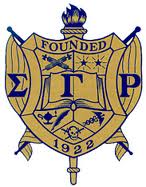
The Nu Delta chapter of Sigma Gamma Rho at the University of Maryland Eastern Shore was chartered in the fall of 1992 with 16 members.
Tutoring and mentoring young boys at the Boxing Association was among the early community service initiatives the UMES chapter took on.
In keeping with Sigma Gamma Rho’s national ideals, the UMES chapter supported over the years the NAACP, National Council of Negro Women, National Pan Hellenic Council, Leadership Conference on Civil Rights, National Urban League, March of Dimes Birth Defects Foundation, National Mental Health Association, United Negro College Fund, Martin Luther King Center for Non-Violent Social Change, Black Women’s Agenda and American Association of University Women.
Members also worked locally with Habitat for Humanity and campaigned for the March of Dimes. The chapter, which is inactive, also sponsored seminars in self-defense and group dynamics.
Sigma Gamma Rho is the lone African-American sorority established at a predominantly white institution – Butler University in Indianapolis. The Ku Klux Klan had a strong presence in Indiana, so its formation in November 1922 was a bold undertaking. The seven founding member – the “seven pearls” – were all educators. The sorority adopted “Greater Service, Greater Progress” as its slogan, royal blue and old gold as its colors and the yellow tea rose as its flower.
Civil Rights and activism:
Sigma Gamma Rho’s early leaders saw the importance of fighting for equal rights when it came to African-Americans’ educational needs. In the 1930s, it sponsored literary contests to give books to young African American students and created the National Vocational Guidance program to help them start careers. Another Depression-era initiative was the Sigma Gamma Rho Employment Aid Bureau to assist members in finding jobs to improve their life.
By the war years, Sigma Gamma Rho established the Sigma Teen Town program to address juvenile delinquency gripping the nation in absence of father figures. Compounding the problem was the number of mothers working in local factories and other jobs in support of the war effort.
Integrating Whites and Blacks in a rarely seen program during the 1950’s,
During the 1950s, Sigma Gamma Rho sorority created Camp Achievement for blacks and whites outside of Pittsburgh and the land eventually was left to the National Achievement clubs.
Sigma Gamma Rho dedicated itself to supporting several civil rights organizations in the 1960s and 1970s, winning the NAACP Service Trophy Award. Members supported President Johnson’s Anti-Poverty Program and implemented nationwide initiatives such as the Vocational Guidance Workshop Center.
Local alumnae chapters award annual scholarships and in 1984 the sorority formed the National Education Fund, created to ensure perpetual support for education and research in the health and education fields. In the 1990s, Sigma Gamma Rho worked closely with Africare and was named one of its Project Africa Gold Donor honorees for raising money to purchase diesel engines and hand-operated grain grinders for the women of Zimbabwe.
It continues to work with Africare on addressing the challenges of HIV/AIDS awareness, education and treatment. The sorority’s current focus is also on domestic health initiatives, including the National Marrow donor Program, the Hattie McDaniel Cancer Awareness and the Rejesta V. Perry Birthright Program (support for children of mothers who have AIDS or HIV).
Sigma Gamma Rho also partners with The March of Dimes and Habitat for Humanity International and created the Sigma Public Education and Research foundation to promote social, civic, cultural, economic, and educational progress for vulnerable or at-risk families and communities. Members also gather school supplies annually in conjunction with offering mentoring and tutoring programs at homeless shelters across the nation – dubbed OPERATION BigBookBag
Members of note:
- Vanessa Bell Armstrong – gospel recording artist
- Corrine Brown – member of Congress – Florida
- Mary Eugenia Charles – former prime minister of Dominica
- Kiamsha Madelyn Leeke – lawyer, writer, radio host and yoga teacher
- Marilyn McCoo – songstress
- Lana Moorer (entertainer MC Lyte) – Pioneer female rap artist
- Beatrice Powell – senior cosmetics company executive
- Victoria Rowell – foster care activist and actress
- Ruth Whitehead Whaley – first African-American woman to practice law in New York
— Frederick Douglass Library archives staff

